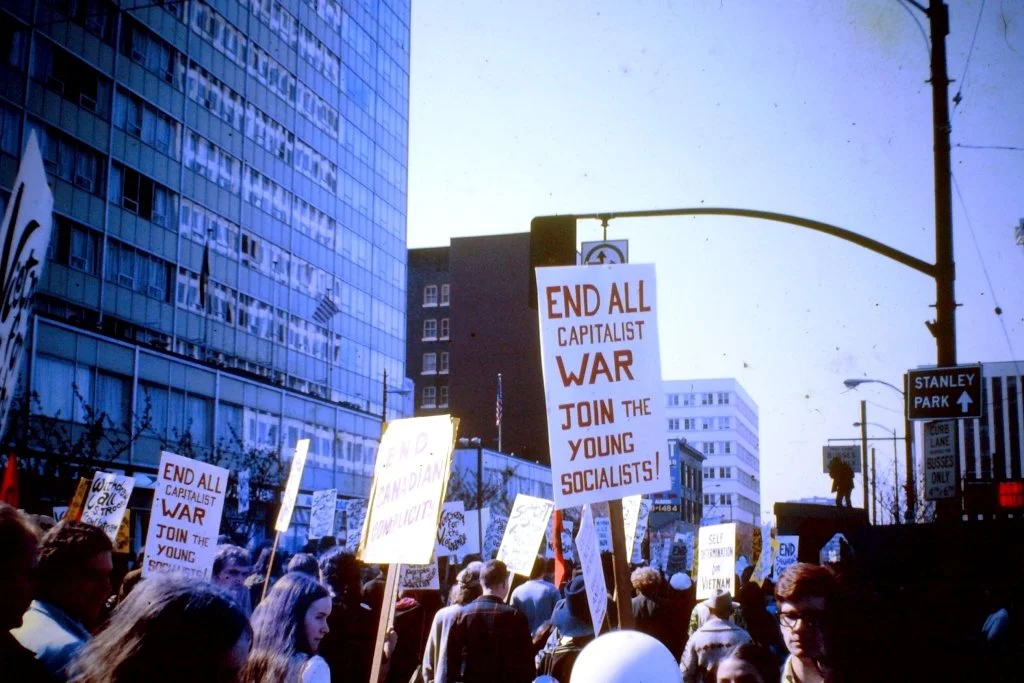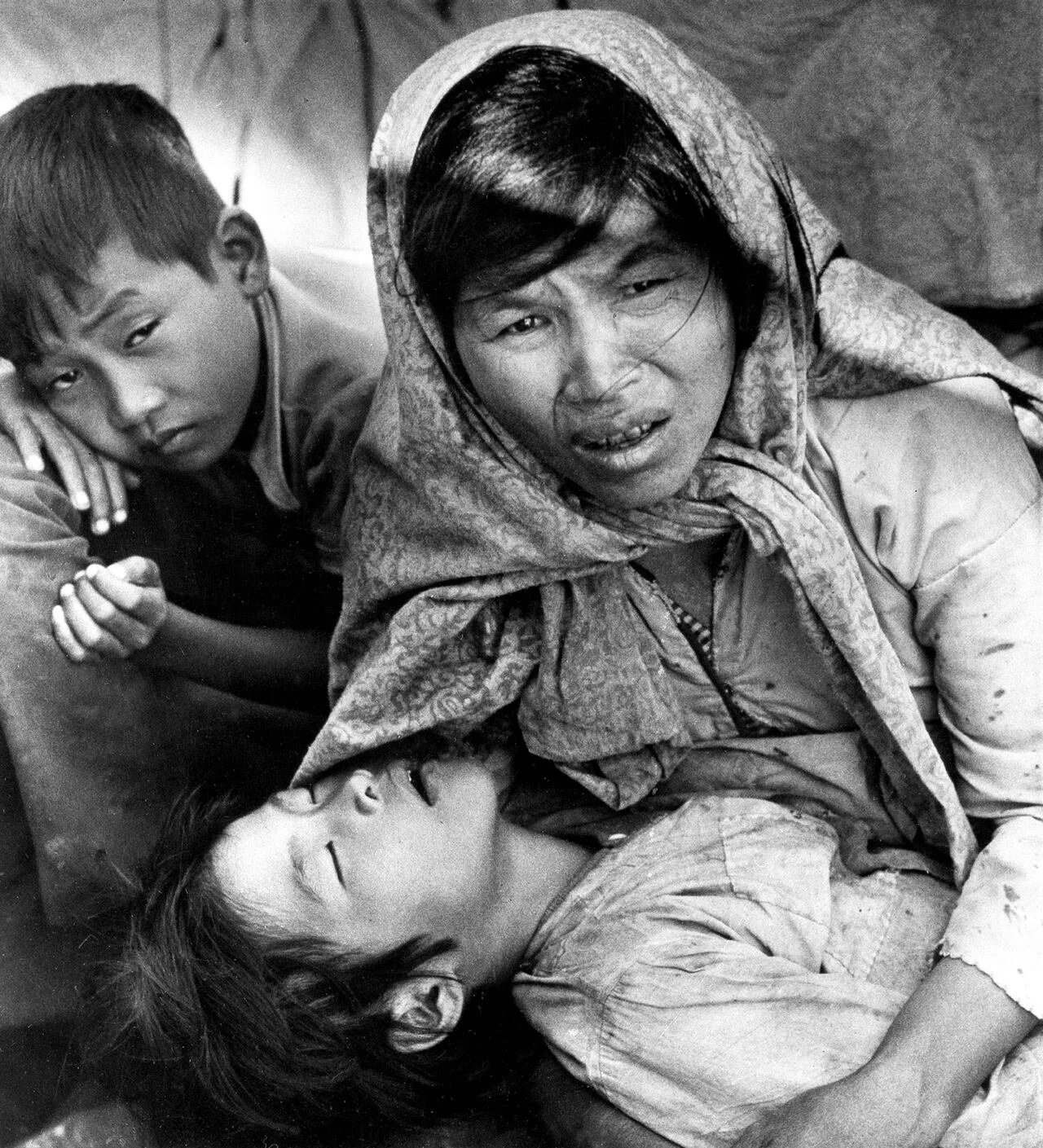What it Means to be an Ally as a Child of Vietnamese Refugees
A reflection on family history and the ongoing fight for liberation – for Palestine and for all.
The author's mother at the SGN airport in Vietnam, circa 1980s. Supplied photo.
By the end of the 1970s, around an astounding 16 million households in America were cable subscribers. As its reach grew, cable transformed the U.S. war against Vietnam from a distant conflict into a living reality. This marked the first televised war Americans bore witness to, and the first time they truly saw the horrors their own country was inflicting on Asian civilians.
As Israel’s attack on Palestine continues, causing telecommunications blackouts across Gaza, civilians have been able to share their experience using social media, a newer medium for news and information, via e-sims. This means that, despite the bias in western media and Israeli propaganda (e.g. from pro-Israel superbowl ads, misleading attacks on Gaza hospitals), those of us living in the west are able to fact-check and access a more authentic perspective from Palestinian journalists sharing their live experiences, on the ground, all while attempting to survive constant warfare.
Anti-Vietnam war demonstration. Vancouver, BC. 1968. Photo: John Hill.
Social media’s window into Gaza
Growing up in Canada, I do not have to face the horrors and tragedies my parents endured during the U.S. war against Vietnam. But from the stories I was told growing up and, now, through the ongoing exposure of the Palestinian genocide, I am reminded of what my family and relatives experienced.
Some of my family were exposed to carcinogenic Agent Orange, rushed to shelters in safety zones, and tightly packed into rickety boats where survival was minimal and not guaranteed. Not unlike that period of war, today, Palestinians are enduring starvation, constant bombardment, and ongoing displacement. Meanwhile, thousands upon thousands of children have been killed or are undergoing surgery and amputation without anaesthesia; many have also been left orphaned.
As a child of Vietnamese refugees and a settler displaced due to western involvement in Asia, there is an aversion to living in the west that I harbour. To bear witness to – from the comfort of my home in Canada – the Palestinian genocide and the displacement of millions is a privilege, one that demands a responsibility to bring attention to the ethnic cleansing at hand, to learn from this, and to help prevent it from ever happening again.
A broken system
Whether due to persecution, violence, or escaping war, a refugee is someone who cannot or is afraid to return home. The war against Vietnam claimed 1.7 million Vietnamese lives and displaced 13 million refugees. After April 30, 1975, when the Vietnamese were fleeing the communist regime and escaping persecution, Canada was among the top countries to take in the most refugees – a historic 60,000, from 1979 to 1980, to be exact. The country was even awarded the Nansen Award for its generous intake.
A Vietnamese woman holds her sick child as she pleads for help from fishing boat carrying 48 other refugees. Photo: Eddie Adams, Public domain, via Wikimedia Commons.
But yes, there is a prickly contradiction there: it’s well and good to take in refugees, particularly so many, but what about when that same country was complicit in their displacement to begin with? During the Vietnam War, through the testing of Agent Orange in Base Gagetown, New Brunswick, and in dealing arms with the U.S., Canada certainly was complicit. Similarly, the current Canadian government is complicit in the genocide of Palestinians – through taking months to call for a ceasefire (albeit, not a permanent one), continuing to export weapons, providing military assistance to Israel, and providing diplomatic and political impunity to the Zionist entity. (On the other hand, it’s worth noting how Canada approached Ukrainian refugees with utmost urgency. Sounds a lot like racism, doesn’t it?)
The 1948 Nakba, the Arabic word for catastrophe, killed 15,000 Palestinians and displaced at least 750,000. It was only the start of an ethnic cleansing. Over 75 years later, the massacre continues, with Israel having created one of the largest stateless communities across the globe.
“That catastrophe has reverberated across generations,” wrote Lima Al-Azzeh, a Vancouver-based Palestinian writer and editor, for the CBC in November. “My mother was born in Kuwait, but still, my grandparents, as refugees, had to fill out residency forms every couple of years, always uncertain of their fate. If they were denied, where would they go?”
As I write this, there are 1.5 million internally displaced people in Rafah, a city in the southern Gaza strip. With nowhere else to go, so far, over 34,000 Palestinians have been killed, while over 78,000 are injured. While Palestinians in Canada are pleading with their government for family reunification, it feels like an echo of when Vietnamese Canadians lobbied for their relatives to be rescued and privately sponsored their families back home in hopes of reuniting.
Diaspora dreams
In the face of racism, discrimination, and bamboo ceilings — a term for barriers faced by Asians in the workplace — those of us in the diaspora are expected to feel grateful for the opportunities we are given as structural inequalities persist. We are told to aspire to a western dream, one filled with financial freedom and 2.5 kids, as if that might erase a painful past, one our immigrant parents can never forget. My mother, for instance, has “mixed feelings” about living in Canada, and would return home if she were in a better economic position to do so.
“While Palestinians in Canada are pleading with their government for family reunification, it feels like an echo of when Vietnamese Canadians lobbied for their relatives to be rescued and privately sponsored their families back home in hopes of reuniting.”
While I myself feel displaced in the west, the privilege that I and the Viet diaspora have is the ability to return to our home country with minimal restrictions, which is a right that has been denied to Palestinians since 1948. As a result, the rage, grief, depression, feelings of powerlessness, survivors guilt and the feeling of wanting to go “home” are common sentiments among the Palestinian diaspora.
In her essay for the CBC, Al-Azzeh goes on to write, “That’s the world we live in now. A place where nobody feels safe or at home, where we’re afraid to express our full identity and humanity, and where anyone and everyone’s fate may be forfeited — played like a chess piece — at the whim of a handful of imperialist powers who have made it all too clear that their singular goal is the accumulation of power, not protecting lives.”
Reverberations of resistance
To this day, the effects of the U.S. war against Vietnam persist. There are many U.S. and Vietnamese war veterans living with PTSD; some Canadian military personnel are still dealing with health risks from the testing grounds of Agent Orange at Base Gagetown. The mental and physical suffering extends far beyond immediate injuries and casualties; this trauma has affected veterans, active personnel, and entire communities for generations. War, as it turns out, is a public health issue.
This is why, as grown third-culture kids (who’ve spent their formative years in a culture other than their own) with continued access to our homeland, I feel it is our duty as East and Southeast Asians living in the diaspora to condemn the erasure of Palestinian lives, homes, and culture, and to ensure that there is a right to return for Palestinians living abroad.
As allies in solidarity, we must hold space to discuss how displacement impacts our ties to our homeland, the prevention of refugee-making and how to rewrite our histories with the inclusion of resistance. We must continue to boycott, divest, and protest for a liberated Palestine and listen to Palestinian Liberation Movements.
Maka Ta is beginning her thirties by reflecting on what it means to be liberated. Still figuring out how to make a career off of varying skill sets and a whole lot of ambition, she struggles to find her niche, and hopes through her writing in comedy, essays and screenplays that making people laugh and think can remedy the current bane of existing in late stage capitalism. You can find Maka in Montreal where she hosts mahjong events or comedy shows, as well as volunteering for organizations whose goals are to defund the police, decriminalize drugs and offer safe supply, and raise awareness of struggles and issues within Chinatown.
P.O.V. is a place where the Asian community can voice their views and perspectives on topics that matter most to them. Interested in contributing? Email us at stories@representasianproject.com.



